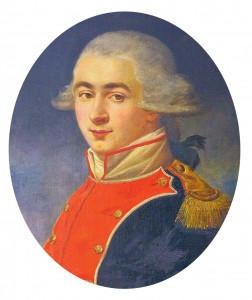
Marquis de Lafayette
Lafayette College will throw a big party on campus Tuesday, Sept. 7, to celebrate the birthday of the Marquis de Lafayette, in whose honor the College is named.
All students, faculty, and staff members are invited to enjoy a picnic-style dinner on the Quad featuring entertainment by student musical groups and an appearance by the Marquis himself, as portrayed by historical interpreter Loic Barnieu. The festivities will begin at 4 p.m.
The celebration will include two screenings of a new documentary film chronicling the Marquis’ life and times. The film, Lafayette: The Lost Hero, will be shown at 4:15 p.m. in Limburg Theater and at 6:30 p.m. in Colton Chapel. A major new production of WETA, the PBS affiliate in Washington, D.C., it is scheduled to premiere on PBS stations across the nation at 10 p.m. Eastern Time Monday, Sept. 13. It will air on the Lehigh Valley’s PBS affiliate, Channel 39, WLVT-TV, at 9 p.m. Monday, Sept. 20.
Monday, Sept. 6, is the 253rd anniversary of the birth of the Marquis. Because the birthday falls on Labor Day, the College will celebrate on Tuesday. Most administrative offices will close at 4 p.m. to allow staff to attend. The rain date for the event is Wednesday, Sept. 8.
“The Marquis de Lafayette was one of the truly great and remarkable people in history, and it is our good fortune at Lafayette College to be associated with this champion of the human spirit who was so deeply dedicated to individual freedom and liberty and understood so well the connection between a free society and an educated citizenry,” says President Daniel H. Weiss. “Our seniors and many members of the faculty and staff will recall our memorable yearlong celebration of the Marquis’ 250th birthday in 2007. I am pleased that we will have another opportunity to reconnect with his ideals and to find inspiration in his life of global service and his legacy of liberty.”
The College awarded the Marquis de Lafayette the honorary degree of Doctor of Public Service (posthumous) at the 175th Commencement in May. The following brief biography appeared in the Commencement program.
MARIE JOSEPH PAUL YVES ROCH GILBERT DU MOTIER, MARQUIS DE LAFAYETTE (1757-1834), was a renowned statesman who boldly championed the cause of freedom and individual rights throughout his life. A French aristocrat and a military leader in both the American and French revolutions, Lafayette was beloved on both continents. During his 1824 triumphal Farewell Tour of America, which concluded 185 years ago, the Marquis was greeted with expressions of great esteem everywhere. Easton lawyer James Madison Porter was so impressed upon meeting him in Philadelphia that he proposed the town’s new college be named Lafayette as “a testimony of respect for his talents, virtues, and signal services . . . in the great cause of freedom.”
Born into a family with illustrious ancestors on both sides, it seemed likely that Lafayette would have a conventional aristocratic, military career. Instead, he took a different direction, joining the Freemasons in 1775 and two years later, at age 20, buying a ship and sailing to America to volunteer for service in General George Washington’s army. A revolutionary from an early age, he adopted the motto “cur non?” (why not?) for his coat of arms. He wrote in a letter to his wife during the voyage, “The welfare of America is intimately connected with the happiness of all mankind; she will become the respectable and safe asylum of virtue, integrity, tolerance, equality, and a peaceful liberty.”
As principal author of the “Declaration of the Rights of Man and of the Citizen” (1789), he helped propel the French Revolution. In the final decade of his life, he took part in France’s 1830 revolution and also voiced support for revolutions in Greece, Poland, Italy, and South America. An ardent supporter of emancipation and a member of anti-slavery societies in France and America, Lafayette also lobbied for the restoration of civil rights to French Protestants and was instrumental in ensuring that religious freedom be granted to Protestants, Jews, and other non-Catholics. A friend to Native Americans, he also endorsed the views of leading women writers and reformers of his day.
On June 30, 1832, a month after the first students matriculated at Lafayette College, five of them—members of the Franklin Literary Society—wrote to Lafayette that they had made him an honorary member to pay “a feeble though sincere tribute of regard to a man who has proved his own and our country’s benefactor, and whose enlarged philanthropy as with a mantle of blessedness would cover the whole family of man.”
When Lafayette visited Congress in 1824, Speaker of the House Henry Clay delivered an address citing the deep respect and admiration held for him due to his “consistency of character . . . ever true to your old principles, firm and erect, cheering and animating, with your well-known voice, the votaries of liberty, its faithful and fearless champion, ready to shed the last drop of blood, which here, you so freely and nobly spilt in the same holy cause.” But it was not until 178 years later, on August 7, 2002, that Congress made him an honorary citizen of the United States.

2 Comments
Comments are closed.